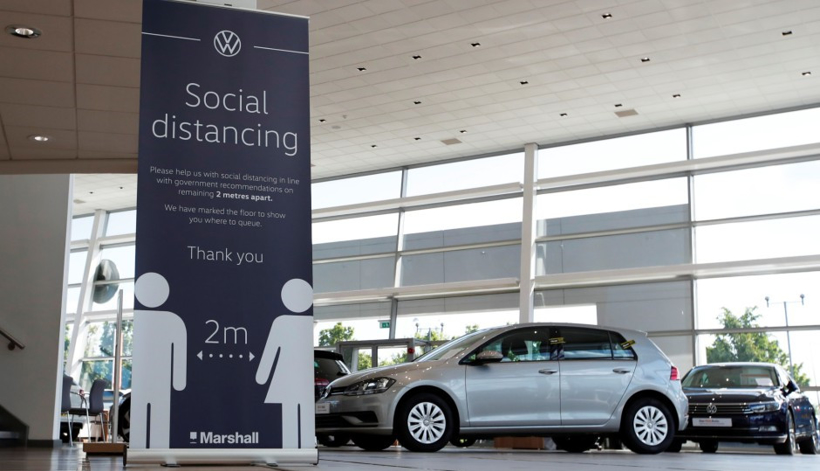Scan QRCode

According to LMC, the market forecaster, the global car market is now experiencing a typical "V-shaped" recovery, with global light vehicle sales expected to reach 75m this year. "This is a rapid rebound," but it may prove difficult to sustain because of dwindling stocks, falling demand and the possibility of a second outbreak.
On the production side, LMC forecasts global light vehicle production this year is expected to fall 17% to 73.5 million units. Production has recovered better than expected in almost all markets. Production in Europe is expected to fall by 4.4m vehicles this year, a 21 per cent drop. By contrast, China, which has had relatively short shutdowns, is expected to fall only 8 per cent.
The global auto market is experiencing a typical "V-shaped" recovery in production and sales, but the impact of the epidemic will continue for years to come, analysts with LMC Automotive said. LMC forecasts that global light vehicle sales will reach 75m this year, down 17 per cent from 90m in 2019.

It is worth noting that in May, LMC forecast total global sales of just 71m vehicles this year, while in April it said sales could be as low as 70m. "This is a quick rebound," Pete Kelly, LMC's general manager, said last week.
"The seasonally adjusted annual sales rate (SAAR) for July and August was about 98 percent of what it was for all of last year," Mr. Kelly said, noting that April's sales had hit a low of 49 percent, representing a "V-shaped" bottom.
Mr Kelly also warned that as blockades around the world restricted the movement of people and dealers were forced to close, "there has been a significant loss of sales, a net loss of 11m vehicles so far". "The pace of recovery has been surprisingly strong," he said, largely due to pent-up demand, stimulus packages and, to a lesser extent, industry incentives.
Globally, LMC expects 16.5m cars to be sold in Europe this year, down 20% from 20.7m in 2019. Sales in North America will fall 19% to 16.4 million vehicles from 20.2 million; Sales in China, on the other hand, will fall 7.5 per cent from 25.5m to 23.6m.
In spite of a stronger recovery, "the question is how long this level of sales can be sustained [which has largely normalised]". "We think it will be difficult to sustain the rally," Mr Kelly stressed.
Kelly also gave some reasons for this: As orders were gradually delivered during the lockdown, demand that had been held back for months would run out; In many countries, where wholesale data are used to chart sales, inventories are falling; In some countries incentives are beginning to end or to diminish; A second wave could lead to more blockades; Moreover, macroeconomic conditions are likely to deteriorate as government stimulus programmes end.
Taking these factors into account, LMC forecasts that global vehicle sales will reach 83 million units in 2021, an 11 percent increase but still nearly 8 percent below the 2019 figure. Sales in the European market in 2021 are projected to be 19 million units, up 15% from 2020 but down 8.2% from 2019.
Mr. Kelly said he did not expect sales to reach 2019 levels until at least the middle of the century, with a gap of at least five million vehicles a year between pre-epidemic and post-epidemic forecasts. "The main reason is the economic trauma and damage that has occurred," he said. "Ultimately, our economy will be smaller than it would have been if there had been no outbreak at all, and that's why car sales are down."
On the production side, the LMC has raised its forecast by 2.7 million vehicles since April and May, when it projected production would be down 20 percent from 88.8 million vehicles in 2019. Global light vehicle production is expected to fall 17 per cent to 73.5m units this year.
"Production has recovered better than expected in almost every market," said Jeff Schuster, LMC Automotive's President of global forecasting. Production in Europe is expected to fall by 4.4 million vehicles this year, down 21 percent from 2019, he said. By contrast, production in China, which has had a relatively short shutdown, is expected to fall by only 8 per cent this year.
Carmakers with a greater stake in The Chinese market will have less to lose because of the relatively small decline in Chinese production and sales, Schuster said. The biggest losers were PSA Group and The Renault-Nissan-Mitsubishi Alliance, each down 25%; Fiat Chrysler dropped 23%. That compares with sales declines of just 11 per cent at BMW and Hyundai, 15 per cent at Volkswagen and 17 per cent at Daimler.
AMS2024 Exhibition Guide | Comprehensive Exhibition Guide, Don't Miss the Exciting Events Online and Offline
Notice on Holding the Rui'an Promotion Conference for the 2025 China (Rui'an) International Automobile and Motorcycle Parts Exhibition
On September 5th, we invite you to join us at the Wenzhou Auto Parts Exhibition on a journey to trace the origin of the Auto Parts City, as per the invitation from the purchaser!
Hot Booking | AAPEX 2024- Professional Exhibition Channel for Entering the North American Auto Parts Market
The wind is just right, Qianchuan Hui! Looking forward to working with you at the 2024 Wenzhou Auto Parts Exhibition and composing a new chapter!
Live up to Shaohua | Wenzhou Auto Parts Exhibition, these wonderful moments are worth remembering!
Free support line!
Email Support!
Working Days/Hours!





